There are a small number of companies making genuinely biodegradable, non-toxic, and eco-friendly disposable wet wipes, but these are the exception to the rule. I’ll talk about these in a moment. First, though, as with diapers, the most eco-friendly option for wet wipes is to choose reusables where possible.
Table of Contents
How does this work in practice though? After all, it’s hard to deny the convenience of pulling a disposable wet wipe out of a plastic pack and then throwing it in the trash (never flush them!). We’ll cover our top picks for reusable baby wipes below, which are by and large the more sustainable choice.
If you need a disposable pack in a pinch though, you can click here to jump down to our wrapup of the best disposable wipes currently on the market too. Need some disposable diapers just in case too? We’ve got you covered there as well with our list of the best sustainable disposable diapers.
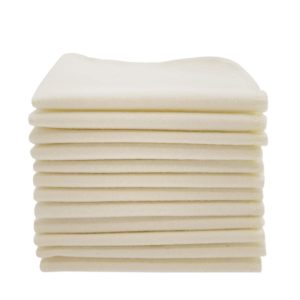
Best reusable baby wipes
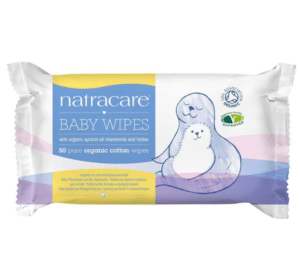
Best disposable wipes
The Best Eco-Friendly Reusable Baby Wipes

ImseVimse Organic Cotton Washable Reusable Baby Wipes
Highlights: Reasonably priced wipes that are made of 100% GOTS certified organic cotton flannel.
My favorite eco-friendly reusable wet wipes are the very reasonably priced ImseVimse Organic Cotton Washable Reusable Wipes that come in packs of 12 and are made of 100% GOTS certified organic cotton flannel. The company uses GOTS certified fiber-reactive dyes, which are low-impact synthetic dyes that directly bond with the garment fibers, so they don’t leach from the fabric. Their pads are all dyed aside from the natural ones, which are the ones I’d choose.
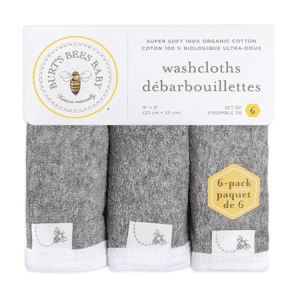
Burt’s Bees Baby Washcloths
Highlights: Made with GOTS certified organic cotton that is absorbent and super soft.
Burt’s Bees Baby Washcloths are another great choice. These are made with GOTS certified organic cotton that is absorbent, super soft, and knit terrycloth smooth on one side and with a loop texture on the other. They are neatly finished with a 100% organic cotton trim, currently priced very reasonably at around $12 for six, and measure 8.5 inches square.
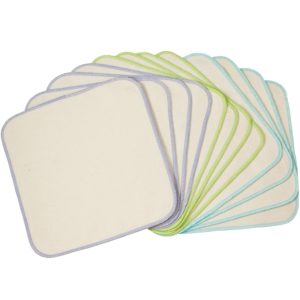
OsoCozy Organic Flannel Baby Wipes
Highlights: These wipes are absorbent, soft, and made with organic cotton that’s entirely unbleached.
If you’re keen on something with a homemade feel, check out the organic flannelette baby wipes from OsoCozy. These measure 9 inches square, are made with organic cotton harvested according to SKAL International Standards for Sustainable Textile Production and come in a 12-pack priced at just $13.50. They are absorbent, soft, and made with unbleached fabric, so no need to worry about toxic chemicals. They’re made in the USA by stay at home moms and grandmas.
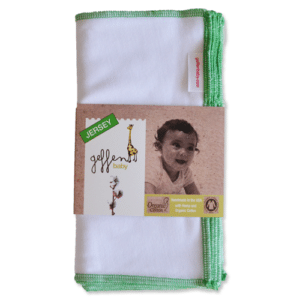
Geffen Baby Wipes
Highlights: The hemp in these wipes makes them a bit better for the environment and more absorbent than regular organic cotton.
Geffen Baby currently offer two types of reusable wipes: a French Terrycloth with one smooth and one slightly textured side and a soft Jersey Knit. Both are soft and absorbent and measure 9 inches square. The cloths are made in the US and comprise 60% hemp and 40% organic cotton, with the hemp making these cloths a bit better for the environment and more absorbent than regular organic cotton.
Why Reusable Wipes?
My suggestion is to have a set of either the ImseVimse or OsoCozy cloths and a second set of the Burt’s Bees or Geffen Baby cloths. The latter are great for situations where you want a bit more absorption and the former work for pretty much everything else. The ImseVimse cloths are ever so slightly bigger than the Burt’s Bees washcloths and cost $10.99-$16.99 for 12, making them quite a bit more affordable too.
Again, plenty of companies will try to sell you ‘eco-friendly’ bamboo cloth, but the better options by far are the organic cotton, hemp, linen, or wool (in a thinner weave). In a pinch, you can even reuse newborn diaper inserts as wet wipes. Used wet wipes can be added to the diaper pail for laundering later.
Reusable cloth wet wipes are happily free from plastic packaging and will biodegrade within six months to a year when you’re done with them.
Maybe you raised your eyebrows at the price of reusable organic cloth wipes. If so, consider this: disposable wet wipes can cost anywhere from 4-40 cents per wipe; given that you’ll probably use at least as many wipes as diapers in the first year of a baby’s life and will keep wipes on hand for many years to come, this could easily amount to a staggering $800 on wet wipes alone! For me, that certainly puts into perspective the cost of a set of a dozen or so reusable organic cotton wipes.
If you’re on the go and just need a handy pack of wet wipes ASAP, there are some more eco-friendly, non-toxic disposable wet wipes available.
Best Eco-Friendly Disposable Wet Wipes
If reusable wipes aren’t for you, you’ll want to look for disposable wet wipes made with organic cotton or wood pulp, that are biodegradable and free from fragrances, alcohol, parabens, phthalates, irritants, allergens, endocrine disruptors, and other potentially toxic or troublesome ingredients.
Here are my top picks for genuinely eco-friendly, non-toxic disposable baby wet wipes.

Natracare Organic Cotton Baby Wipes
Highlights: These wipes are soft, strong, and biodegradable as well as compostable – and you can start to see them in your typical stores!
Natracare are one of my favorite brands at Leaf Score because they make consistently high quality, non-toxic, eco-friendly products that are increasingly available in regular stores and are comparable in price to far inferior conventional products. Natracare’s organic cotton wet wipes are no exception.
These wipes are fully certified organic by the UK’s Soil Association, are ICEA/IMO certified, are soft, strong, and biodegradable as well as compostable, and are free from alcohol, parabens, phenoxyethanol, and other irritants and troubling chemicals. They are naturally scented with extracts of rose, chamomile, and calendula and are intended as ‘feminine wipes’ but are perfectly suited to use as baby wipes or any other purpose.
Natracare’s products are not tested on animals, are vegan-friendly, and are made with natural, renewable, sustainable resources. And, if you’re in the UK, you can also get your hands on Natracare’s Water UK-approved flushable wet wipes (View Price on Big Green Smile).
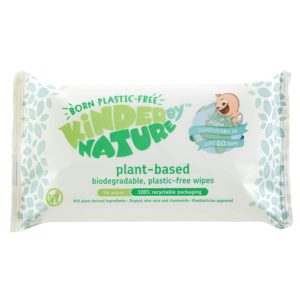
Jackson Reece Kinder by Nature Baby Wipes
Highlights: These wipes are soft, luxurious and gentle on sensitive skin thanks to their thicker-than-average composition.
Jackson Reece baby wipes are soft, luxurious and gentle on sensitive skin. They are thicker than many wet wipes but are free from plastics, are fully biodegradable, and are made with organic wood pulp and a pH balanced, non-irritating liquid solution.
The company clearly cares about environmental stewardship and about babies. In 2020, the company switched to 100% recyclable packaging, and their plant-based wipes are pediatrician approved.
Jackson Reece wipes decompose in 60 days, are vegan-friendly, and are made in the UK. The wipes are not tested on animals and are free from alcohol, parabens, SLS, SLES, lanolin, phthalates, phenoxyethanol or benzoates.
Course participants get a generous discount from Jackson Reece!
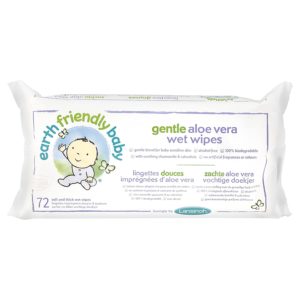
Earth Friendly Baby Gentle Aloe Vera Wet Wipes
Highlights: These wipes are made up of over 70% organic ingredients and are free from alcohol, artificial fragrance and colors, parabens, and SLS.
Earth Friendly Baby wipes are made with sustainable wood pulp and starch and are 100% biodegradable. The wipes contain organic chamomile and organic calendula extracts as well as aloe and are free from alcohol, artificial fragrance and colors, parabens, and SLS. The wipes are made in the UK and feature over 70% organic ingredients. Earth Friendly Baby do not test products on animals and are an award-winning brand well-loved in the UK.
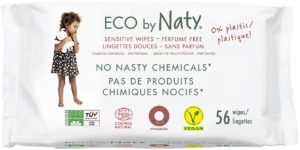
Naty make unscented and naturally scented compostable baby wipes that are chlorine-free and free from alcohol, fragrance, parabens, and phthalates. They are soft and gentle, are made of viscose, and break down into compost in 12 weeks. The wipes are pH balanced, hypoallergenic, and are independently certified as natural by ECOCERT.
Naty products use FSC certified wood pulp, and publish regular sustainability reports. Their latest report states that Naty hopes to launch a disposable diaper made with 100% renewable materials this year!
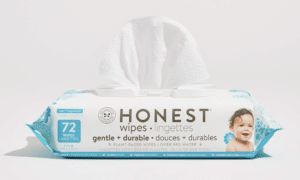
The Honest Company Baby Wipes
Highlights: These wipes are made from biodegradable organic cotton, and mostly non-toxic.
One final option for disposable wet wipes comes from Honest. They now offer dry wipes made with 100% organic cotton, without alcohol, parabens, fragrances or chlorine processing.
Honest’s wet wipes are made with plant-based ingredients (though they don’t disclose the actual fibers), are biodegradable and mostly non-toxic. The main chemical of concern in the wipes is ethylhexylglycerin (also known as 1,2-propanediol), which can be an irritant to skin, potentially causing contact dermatitis or sensitizing skin to other chemicals, can cause serious eye damage, and can be toxic to humans and to aquatic life. The wipes also contain sodium benzoate, which may be toxic, although the small amounts in the wipes is unlikely to prove problematic.
How to Make DIY Wet Wipes
The good news is that it’s super easy to go zero waste with wet wipes. All you need is a Mason jar and some old blankets, clothes, or other fabric, preferably organic cotton, hemp, or wool. Cut the fabric into squares about 9 inches by 9 inches, fill the jar with water and a teaspoon of coconut oil, cap it and give it a shake, then add the cloth squares. If you like, you can add a dash of essential oil such as chamomile or tea tree to the water. Use the wipes as needed, just replace the water every couple of days.
For wet wipes you can use when out and about, just take a handful of wipes from the jar, gently squeeze out excess water, and zip the wipes up in a small wet bag such as this sealable silicone pouch (View Price on Amazon).
Make sure to wash your wipes in an environmentally friendly manner and pass them on or repurpose them once your baby is out of diapers. You can easily reuse cloth wet wipes as napkins, cleaning cloths, or even get sewing and make a handy face mask. And, of course, bonus points if you can make your own wet wipes from scraps of soft material you already have lying around.
If you don’t have scraps of fabric lying about, you can find reusable cloth squares perfect for wet wipes made with organic cotton, hemp, and other natural fibers.
If you’re keeping an eye out for more sustainable and non-toxic alternatives to traditional baby items, make sure to check out the following posts that may be of interest to you:
Love your site! What about Water Wipes?
Thanks Sherissa!
Water Wipes are, unfortunately, not as good as their name suggests. While they’re hydrated with just water and a fruit extract, they are made of 80% polyester and 20% viscose, which makes them only 20% biodegradable at best and likely means they’re treated with a variety of chemicals prior to becoming wet wipe fabric.
Hope that helps. Gotta love that greenwashing!
Leigh
Hello. Which type of coconut oil do you recommend to make my own wipes?
Hi Holanda,
Any organic coconut oil will work well. Refined is probably best as it will mix more easily with warm water. The oil and water will separate in the jar though, so give it a shake before each use.
Let us know how it works out for you!
Leigh
Thank you so much for the article, Leigh! I noticed you wrote, “Again, plenty of companies will try to sell you ‘eco-friendly’ bamboo cloth…” Is bamboo not eco-friendly? I will be so sad if it’s not! I’ve been buying bamboo toilet paper thinking it was better for the environment. Have I been duped? 🙁
Hi Kylene,
Bamboo is one of those materials that can be eco-friendly but often isn’t. The reasons being that it grows super fast, sequesters lots of carbon, and requires minimal inputs (including far less water than conventional cotton). However, bamboo is a hard material, meaning it’s best suited for use in flooring, furniture, and accessories like spoons, toothbrushes, etc.
To make bamboo fibers soft enough for things like wet wipes, toilet tissue, towels, and clothing, manufacturers have to use either a traditional fermentation process that usually takes a long time and is expensive, or use a slew of potentially toxic chemicals to break the fibers down faster. As you can probably guess, most take the latter approach, meaning most bamboo products are produced using problematic chemicals, some of which pose a risk to workers and can enter waterways and harm wildlife.
So, the eco-friendliness of your bamboo toilet tissue will largely depend on how it’s made (very likely through chemical processes) and whether it’s recycled. Using 100% recycled materials for toilet tissue is usually the most eco-friendly approach overall, rather than virgin bamboo.
Overall, though, bamboo toilet tissue is probably more eco-friendly than luxury toilet tissue made with virgin cotton and wood pulp.
The best approach overall would be to ditch the disposable toilet tissue entirely and go with a roll of reusable wipes! You can even get these as a roll to fit a standard toilet holder!
Hope that helps,
Leigh